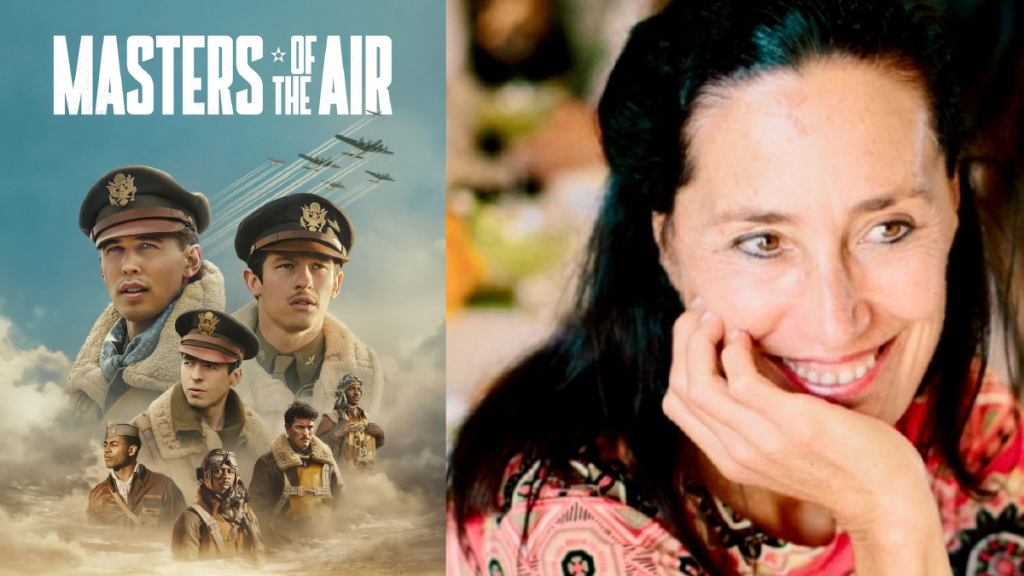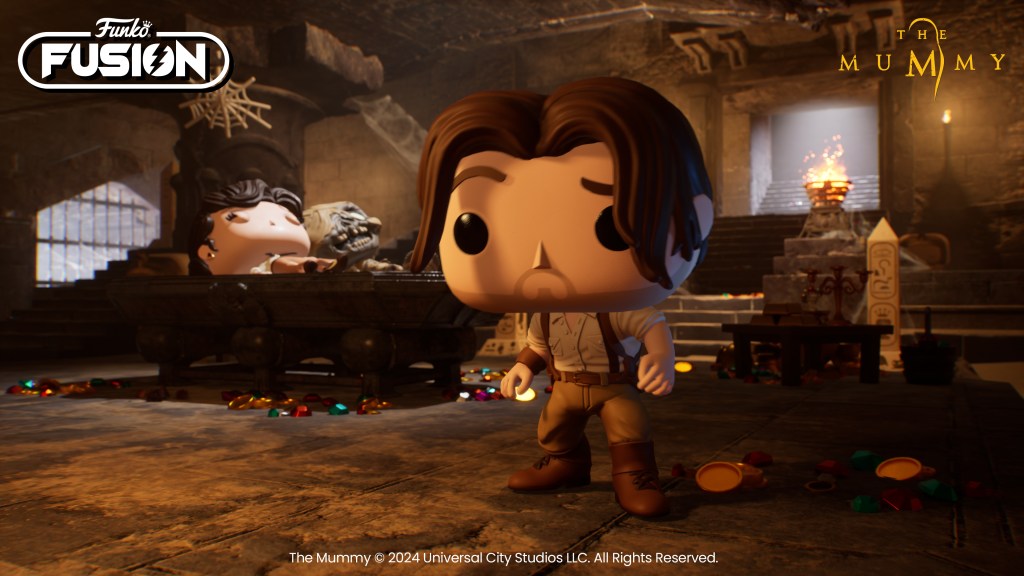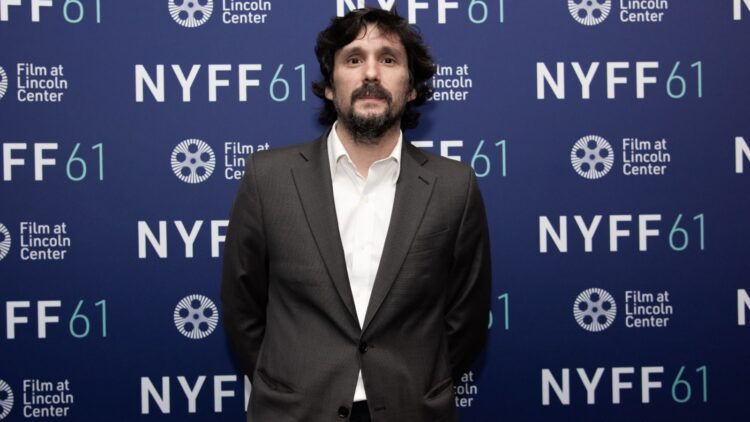ComingSoon sat down with Masters of the Air Music Supervisor Deva Anderson to discuss her work on the acclaimed Apple+ World War II television series.
Deva Anderson is an award-winning Music Supervisor and Executive with unparalleled range and depth. Over the course of her career, she has worked on more than 40 feature films with some of the most esteemed filmmakers in the industry, as well as more than 30 original series for television. Deva excels at facilitating collaboration and envisioning music that brings a director’s vision to life.
Deva got her start in the music industry representing artists before being hired by Tom Hanks and Gary Goetzman as the music supervisor of the iconic musical That Thing You Do!, starring Hanks alongside Charlize Theron and Liv Tyler. Deva was then brought in-house by Hanks and Goetzman as the Head of Music when they launched their production company, Playtone, and has been involved in nearly every Playtone project over the past 25 years, including Band of Brothers, Greyhound and Masters of the Air.
ComingSoon: As Music Supervisor for Masters of the Air, how did you approach integrating music from the era to enhance the authenticity and emotional depth of the series?
Deva Anderson: Masters of the Air is the third installment of the trilogy that started with Band of Brothers and The Pacific. Having music supervised all three projects, I knew that it was extremely important to our filmmakers that all levels of the production be historically accurate. It was a dream project because there is a treasure trove of music from the 1940s to draw from. We believed it was an opportunity to uncover some hidden music gems of the era, such as Vera Lynn’s “Who’s Taking You Home Tonight,” and combine them seamlessly with the more well-known hits of the era like “Blue Skies” at Thorpe Abbots Officer Club and another use of the character Egan singing the song while riding his bike.
Can you discuss the process of selecting music for Masters of the Air that would resonate with viewers while accurately representing the time period depicted in the series?
From early on – as the series was in the script stage — we created a musical timeline of the era, which we used to ground our creative choices throughout production. As a music supervisor, one of the most enjoyable aspects of the work is the creative process with producers and filmmakers, where we brainstorm how to bring the story to life with music. Oftentimes, the best choices come through a back-and-forth – trying different songs and seeing which music best unveils the vision for the emotion and place of the scene. To stay true to every detail in the series, it was important for period accuracy with the songs.
Masters of the Air involved intricate music selections to evoke the characters’ memories of home. How did you go about choosing these specific pieces, and what research was involved in ensuring they were period-appropriate?
The story of the men in the Eighth Air Force’s 100th Bomb Group is about the human experience within the context of war’s brutal nature. Music and songs are a direct sensory route that connects the soul to feelings, memories, or emotions; therefore, it was essential to choose songs that were both accurate to the time period and revealed more about the characters, their personalities, and their emotions. For example, for the character of “Rosie”, we learned the real Rosie Rosenthal loved jazz music. My Co-Music Supervisor Rachel Lautzenheiser and I dove deep into research to explore a multitude of jazz options from the time period before landing on the songs that fit Rosie’s character for several of the scenes.
The inclusion of on-camera performances like Etta James’ At Last adds a unique element to a series. What challenges did you face in re-creating these historical music performances for Masters of the Air?
We had so much fun with this! When you are recreating a live performance of a copyright that is so well known (and this one is particular is a meaningful song for so many people), there is a lot of pressure to ensure the music is presented accurately. This song is most well known from the beautiful Etta James version; however, it was originally written and recorded by Glenn Miller and was a hit on the charts in the 1940s. The on-camera band performance emulated the Glenn Miller style, which has a more subtle smooth jazz feeling, than the Etta James leading vocal version. Our on-camera jazz band also created the celebratory atmosphere in the context of the Officers Club celebrating the character Dye’s 25th mission. The music for the scene needed to capture both the spirit of celebration with the cast dancing and drinking and talking shop and the backdrop of the haunting risk these men take every time they take flight. The song selections and style of the pre-records helped create the delicate balance of simultaneously emulating these two polar emotional realities.
Your work spans a vast array of projects and genres. How did your previous experiences influence your approach to music supervision for Masters of the Air?
I first started working with producers Gary Goetzman and Tom Hanks at the beginning of Playtone on the 1996 musical, THAT THING YOU DO!. We have now worked together for more than 25 years on projects that span different genres and time periods. As a result, we have developed a strong synergy together and intuitively understand how to work together. Gary and Tom have a deep connection to music and as filmmakers, they understand how music needs to be an integral part of the creative process in bringing a story to life. While I’ve stayed in house at Playtone, I also have my own Music Supervision company and have worked on more than 40 projects outside of Playtone; including The Kitchen, Blade Runner 2049 and Book of Eli. I’ve been lucky to work with incredibly talented directors like Denis Villeneuve, Jonathan Demme, Tom McCarthy, and Wayne Wang. I learn and grow with every project I do.
For Masters of the Air in particular, the challenge was to understand that this is a trilogy that fits together. To accomplish this, we built on the creative approaches of Band of Brothers and The Pacific while simultaneously creating a music vision specific to the experience and story of being an airman in the 100th to life. The range of projects I’ve worked on also means that I’m sometimes called in by studios to music consult on projects they have underway. In 2020-2021 I was hired by Netflix to consult on films such as Kissing Booth 3, White Noise and Chupa . And this year, Rachel and I music supervised the upcoming The Piano Lesson directed by Malcolm Washington.
Collaboration between the music department and other production teams is crucial. Can you share how you worked with the directors and producers of Masters of the Air to realize their vision through music?
Music Supervision is bringing a filmmaker’s vision to screen through sound and music. . As music supervisors, we’re involved in all aspects of that process, from the beginning of the script phase to the show’s release. It’s an iterative and integrated process – the actual song selection part is only one aspect of that work. We work closely with the production team during filming and all parts of the post production phase. For Masters of the Air, there were several on-camera music pieces and performances during filming. Since this was filmed in England during the height of COVID, we hired music coordinators and on-set music supervisors to oversee the on-camera music and tag teamed on many of the details for on-set pre-record and playback.
Your role in Masters of the Air began in the script phase and continued through post-production. How does working closely with the production team from an early stage influence the music supervision process?
From the early stage of the project, there were songs that were thought about. By being involved from early script drafts, the process evolved as the scripts were being developed all through filming and post. The musical needs do change, as the vision for the story transforms through the creative process, from filming to post-production. The musical star of the series is our composer, Blake Neely. We have worked with Blake on several Playtone productions and his work on the series is breathtaking. It was important to the filmmakers that the series had an orchestral score and a vast orchestral sound to enhance the drama and intensity of the story. Blake worked incredibly closely with our producer, Gary Goetzman, throughout the series and delivered a stunning, beautifully moving score. The main title score over the main title credit sequence images brought standing ovations at some of our early screenings.
In Masters of the Air, how did you balance the need for historical accuracy in music selection with the creative vision of the series?
Historical accuracy is always first and foremost of importance. We know that fans of the trilogy span multiple generations. We want the music to feel and be true to the story, and a part of that is ensuring we are accurate to the time period with our musical choices. For example, while a scene may take place in summer of 1943, it is crucial that the song was released prior to summer of that year. There are different time frames of when a song was actually written and recorded by the artist, when the song was released, and when it was on the top charts. As music supervisors, we have to delve into the history of the music – it is not enough that it fits a scene. We want to ensure that the filmmakers have all the context they need around the music itself. There are times when filmmakers take creative liberty if the song provides the perfect feel for the scene, and it’s our job to ensure they know when they are doing that.
Your career has allowed you to give breaks to new talent, such as Johann Johannsson. Did Masters of the Air present any opportunities to introduce new musical talents, whether composers or performers?
Introducing Johann Johannsson to Denis Villeneuve for the film PRISONERS was a beautiful experience. To me, there is nothing more satisfying than when a director matches perfectly with a composer. In Episode Six of Masters of the Air, we were lucky to have a musical gem of a talent, Eithne MacSweeny, sing a unique and moving on-camera rendition of “Tear the Fascists Down”. The opportunities for introducing other new talent for Masters of the Air were more in the realm of finding some lesser known songs that haven’t been exposed in film or TV projects much. For example, In Episode One, “Sleepy Town Train” was our first song in the episode and was a B side to Glenn Miller’s “Juke Box Saturday Night.”
Reflecting on your extensive career and your recent work on Masters of the Air, what do you find most rewarding about being a music supervisor in today’s film and television landscape?
The film and television landscape has changed over the years, but the biggest reward has always been the creative collaboration with the people who make these films and TV shows. So much of music supervision involves being flexible and the ability to pivot quickly whenever needed, whether it be a schedule change, creative directional change, budget allocation, or platform change. This continuously evolving landscape contributes to making music supervision more stimulating, challenging and fun. Each project is so different; therefore, I get to dive in with a fresh state of mind and enthusiasm with each one.
The post Interview: Masters of the Air Music Supervisor Deva Anderson Talks WWII Epic appeared first on ComingSoon.net – Movie Trailers, TV & Streaming News, and More.





